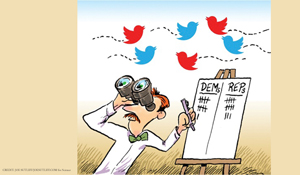New Paper Discusses How Social Media Manipulation Affects Voter Perceptions of Political Candidates, Could Impact Decision Making

Wellesley, Mass., October 25, 2012 – In an article to be released tomorrow, Friday, October 26, in Science, a journal by the American Association for the Advancement of Science (AAAS), two Wellesley College professors discuss the role of social media in elections and how manipulation of social media can both affect a voters’ perception of a candidate and compromise the voters’ decision-making abilities. With two out of three people in the United States using search engines and social media sites, such as Facebook, Twitter, and YouTube, this sort of manipulation could have major implications for the November election.
“Each of us keeps a mental trust network that helps us decide what and what not to believe,” wrote Panagiotis T. Metaxas, Professor of Computer Science and Founder of Wellesley College’s Media Arts and Sciences Program, and Eni Mustafaraj, Hess Fellow and Visiting Assistant Professor in Computer Science. “In times of political elections, the stakes are high, and advocates may try to support their cause by active manipulation of social media. For example, altering the number of followers can affect a viewer’s conclusion about candidate popularity”
Mustafaraj and Metaxas have studied “Google bombing” and discovered the first instance of political “Twitter bombing” and other manipulation efforts to determine how social media propaganda effects voters. “Google bombing,” a type of Web spam that has had an impact on past elections, is less effective now that search engines, including Google, have adjusted their ranking methods to defend against this kind of attack. However, “Twitter bombing,” which Metaxas describes as “creating a large number of Twitter accounts and sending a large number of unsolicited tweets to unsuspecting users within a short period of time,” can potentially confuse voters, especially if it is done shortly before the elections.
According to the researchers, “Twitter bombing” and “astroturfing,” a term used to describe a fake grassroots movement, have become common. The researchers suggest that critical thinking is as important a skill now as it was ever, and it should be integral part of our education.
Using social media for predicting elections is highly controversial. The researchers note that there’s no agreement among researchers yet on what measures should be used for successful prediction. Just having a large number of tweets, for instance, should not suggest a representative sample of the voting population. Metaxas and Mustafaraj found that in political conversations, for example, approximately one percent of twitter accounts are responsible for 30 percent of the tweeting volume, meaning that a significant portion of what a Twitter user monitoring a political conversation sees might actually be propaganda.
Panagiotis “Takis” Metaxas is a Professor of Computer Science and Founder of Wellesley College’s Media Arts and Sciences Program. Eni Mustafaraj is a Hess Fellow and Visiting Assistant Professor.
The paper will be available in the Journal Science at http://www.sciencemag.org/ on Friday, October 25, 2012.
About Wellesley College
Since 1875, Wellesley College has been a leader in providing an excellent liberal arts education for women who will make a difference in the world. Its 500-acre campus near Boston is home to 2,400 undergraduate students from 50 states and 75 countries.
About Wellesley College Faculty and the 2012 Elections
Wellesley's world-class faculty are available to comment on the topics that matter most as we approach Election Day 2012 including issues relating to the presidential election, the Massachusetts senatorial race, and the contest for the Massachusetts 4th Congressional district. Please contact mediarelations@wellesley.edu or visit our special page on elections for more information.
Press Contacts:
Anne Yu, Wellesley College, 781.283.3201, ayu@wellesley.edu
Sofiya Cabalquinto, Wellesley College, 781.283.3321, scabaqu@wellesley.edu
